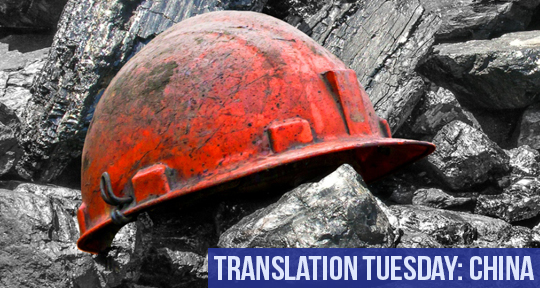This week’s Translation Tuesday features two labour-centric poems by Du Ya. “The Coal Miner” could be construed as a multivalent metaphor aligning the work of a coal miner with an unbearable lack of clarity regarding one’s position in the world. On another register, however, “The Coal Miner” shows how one’s occupation and environment can be written on and in the body, as well as the mind. “Copper” looks at the quality of the sub-strata itself. It is an homage to the hidden beauties and forms that underpin all that happens upon a surface. Copper’s stability, its cycles, and their accumulations might be related to translation itself, a conceptual attitude that recalls the archaeological cultural exercises of Walter Benjamin and the re-working of source materials to gain new insight or expression. Time can be read in the changes in striation and the different iterations of copper, constantly moving beneath the surface and in the hands of artisans, as a poem or thought too changes—and stays the same—as it moves.
The Coal Miner
He means to tell people about the light
but each part of his body revolts
disobeys the center, speaks only of darkness
Having gnawed so long on that mighty seam, he has no idea
that his lungs, liver, and intestines are now made of coal
The textbooks teach this: “change in quantity leads to change in quality”
His body is such a fitting exhibit, it needs no explanation
It wears pitch black shadowless silk
like a government official donning a tailored uniform
Yet he still speaks of light—and for light
he daily lowers himself underground (and time flows unchanging)
Not even the nightfish has seen such darkness
Sometimes, in the subterranean depths, he is frightened
He recalls darkness: changes in earth over hundreds of millions of years
It astounds him: black, plummeting, set in motion eons ago
Copper
From the deep time of glaciers to the surface of the earth
the sound of copper has the weight of millennia
Listen—kong dong tong
It’s as if a silent bronze-hued artisan
lived for years inside the earth and forged a copper bell
tough beyond measure, eternal as the stars
Maybe there is no bell, just elemental copper
rumbling beneath you everywhere you go
Most of the time, that sound rises up to the middle of everything
In the past, the sky would dim into evening, clouds leaking light
Some nights its unchanging face was strung with icy light
Other times snowdrifts hid the wilderness: the copper mute and traceless
Copper by turns hidden and seen, copper tied to everything on earth—
when we lose it, when it turns and departs from the world
we will wither, decay, lose our life
Through the iron-black ages, I would hear the copper
as I wandered in the wilderness, slept facing the moon, the sound
of copper surged from below: a raging horse, a pack of tigers
Translated from the Chinese by Anni Liu
Du Ya was born in 1968 in Henan Province. Before becoming an editor and writer, she worked as a nurse for ten years. She is the author of The Wind Uses Its Bright Wings (1998), Selected Poems (2008), and Sunset and Dawn Light (2016). She is the recipient of the Liu Lian Poetry Prize, the Yangtze Poetics Award, and was named one of the top female Chinese poets of the new century. Some of her poems have been translated into German, Russian, Czech, Italian, Japanese, and other languages. She lives in Xuchang, Henan Province.
Anni Liu is a writer, translator, and editor with work published or forthcoming in The Kenyon Review, Pleiades, Cream City Review, and elsewhere. You can find her other translations of Du Ya in Waxwing. She is the recipient of a 2019 ALTA Travel Fellowship and the inaugural Undocupoets Fellowship. She holds an MFA from Indiana University and works at Graywolf Press.

